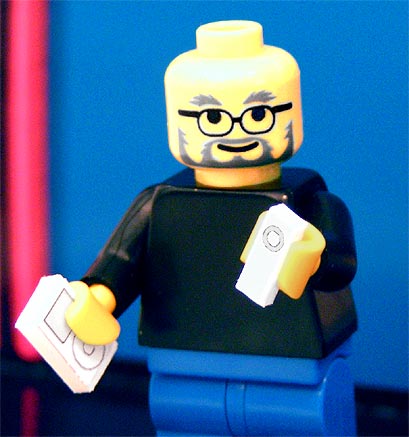I mention Apple’s CEO Steve Jobs a lot in these columns. Yes, I am a fan of Apple products, but the reasons for my admiration go deeper than a love of consumer electronics products. Below are some lessons I take away from his continuing legacy, which I feel can benefit any brand and any career:
- Focus on What Matters, Not What’s Easy.
Jobs challenges people to create things that need to be created, not things that can be created. From the first Mac product, to developing the personal computer, iMac, iPod, iPhone, iTunes and so many other products – Jobs pushes his team to get passed barriers that many consider insurmountable.When no one else could find a reasonable model for paid digital music, somehow Jobs negotiated deals with the major labels, setup a pricing and distribution structure that resonated with music buyers, and matched it all to an incredibly well designed MP3 player. I remember people scoffing at the price of the original iPod, but the rest is history.
He didn’t set out to extend his reach into other consumer electronics, he set out to reimagine the music industry. And despite his late arrival to the game, he succeeded where everyone else failed.
- Be an Exclamation Point, Not a Footnote.
Despite tiny market share compared to PC computers, Apple is a cultural touchstone – with a disproportionate influence & profit compared to other computer brands.Apple products are specific – they are controlled – and they are the same price everywhere you go. The brand seemingly makes suicidal moves that nearly always prove to be brilliant.
When they chose to open a series of expensive retail stores, it seemed a fools endeavor. Now, these stores are a wildly popular, wildly profitable, and to be honest, the reason my parents bought their Mac.
Jobs is not creating products, he is creating history.
- Your Ideals Should Spread.
Steve seems to go by the old adage: "Create nothing that is not incredibly useful or incredibly beautiful." Surprisingly, he has taken concepts such as minimalism, and the stark practices of industrial design and made them sexy and coveted.
Other manufacturers copy his designs blindly, rarely even grasping the concepts underlying the design & function.
- All Viable Products Must Support the Business.
Beauty and function seem to be the only two things that matter to Jobs, and yet, there is more. Apple’s products are very profitable. Unlike The New York Times or Twitter, Steve is not following his ideals at the expense of the business.He is also savvy about creating entire economies around his products: music files, iPhone apps, iPod accessories, and the like. He makes it profitable for other businesses to focus on Apple.
- Believe in the Power of Symbols.
Again and again, Apple creates symbols that resonate within our culture. The constant underdog, the company always seems to be on the brink of overextending their hype – and yet – they never do.The brand inspires, it creates an identity for those who use its products, and gives people something to desire.
Symbols are difficult – they require you to choose sides, to embrace or reject. Symbols don’t apologize.
- Strive for Completeness
Apple’s products offer a complete solution, not just single element in a larger process. The risk here – of course – is too much control, of which Apple is constantly accused. But when the solutions work this well, they are hard to ignore.Success of the iPod was built on the iTunes model, not just the iPod product itself. It was an integrated solution to stealing music – not a technical solution as to how to design a better MP3 player.


It seems that apple is certainly facing some problems and it should get out of these problems asap as they have to remain in the market.
Microsoft has always been a competitor for Apple but I think Apple has certainly made a mark in the industry and it needs to continue producing some good products in order to continue this.